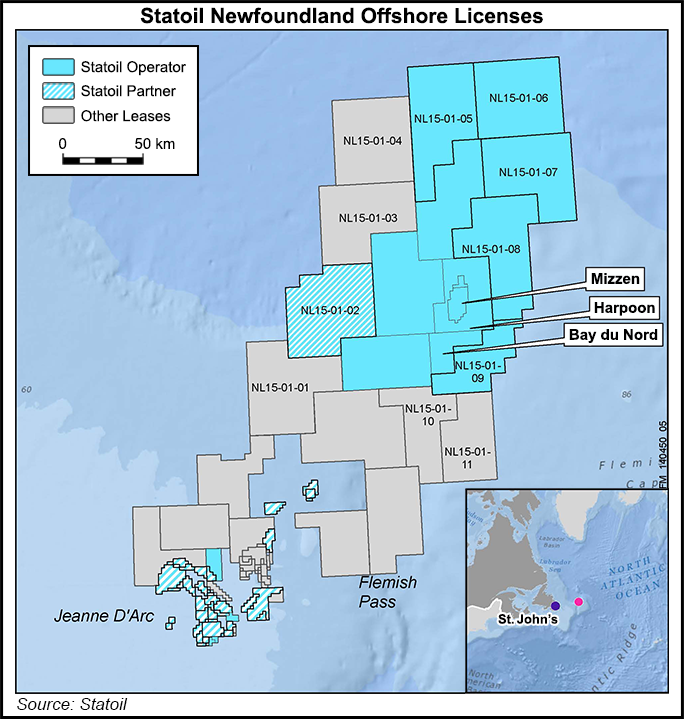Statoil Touts Two More Discoveries Offshore Eastern Canada in Flemish Pass Basin
A 19-month exploration program offshore Newfoundland in the frontier Flemish Pass Basin has yielded two more discoveries, strengthening the promise for future development in Eastern Canada’s offshore, Statoil ASA said.

The producer and its partners drilled nine wells about 500 kilometers (310.6 miles) east of St. John’s in Newfoundland and Labrador (NL) to improve their understanding of the frontier basin. Four exploration wells were drilled near Statoil’s 2013 Bay du Nord discovery, while three appraisal wells were drilled on the discovery and two exploration wells were drilled in areas outside the discovery. The two latest discoveries were at the Bay de Verde and Baccalieu prospects in the Bay du Nord area.
“We are encouraged by the discoveries in the Bay de Verde and Baccalieu wells and the results of the appraisal wells,” said Senior Vice President Erling Vagnes, who oversees Statoil Exploration, Northern Hemisphere. “Based on the improved understanding of the Flemish Pass Basin petroleum system, we are maturing further prospects that may add volumes to Bay du Nord.”
The appraisal and near-field exploration of the Bay du Nord discovery reduced “key reservoir uncertainties” and confirmed that the volumes were within the original volume estimate of 300-600 million boe that Statoil had estimated three years ago — but potentially toward the lower end of the range.
“The Flemish Pass Basin offshore Newfoundland is a frontier area, where only 17 wells have been drilled in the entire basin — in an area that is 30,000 square kilometers,” or 11,583 square miles, Vagnes said. “This drilling campaign has been critical both to maturing the Bay du Nord discovery as well as evolving our knowledge of the greater basin and Newfoundland offshore, which remains a core exploration area for Statoil.”
The drilling program began in November 2014 and was extended by one month to incorporate the drilling of Baccalieu, a well on a license awarded in last year’s lease sale. Late last year Statoil and partners ExxonMobil Corp., Chevron Corp., BP plc and the former BG plc (now part of Royal Dutch Shell plc) claimed six frontier exploration licenses in the Flemish Pass Basin and two licenses to explore offshore Nova Scotia. (see Daily GPI,Nov. 13, 2015). Four years ago Statoil also partnered with units of Chevron and Repsol YPF to explore NL’s deepwater Orphan Basin and the Flemish Pass Basin (see Daily GPI,Jan. 13, 2012).
Statoil was able to progress the Baccalieu drilling from access to well completion in four months.
The discovery in the Baccalieu prospect “demonstrates how nimble and responsive our offshore can be when we work together,” NL Minister of Natural Resources Siobhan Coady said.
“Statoil was issued an exploration license in January 2016, began drilling a well in March, and has already announced the discovery of oil. Statoil will now review the information gathered in its drilling program and will assess the geology. We look forward to their analysis.”
Assessment of the commercial potential of the Bay du Nord discovery is ongoing.
“The recent drilling program has been critical to Statoil’s continued assessment of Bay du Nord, and work is underway to evaluate the results related to proceeding with a potential Statoil-operated development in the Flemish Pass Basin,” said Statoil Canada President Paul Fulton.
According to the province’s natural resources ministry, 13 exploration well tracks have been drilled in Flemish Pass to date with five discoveries: Mizzen, Harpoon, Bay du Nord, Bay de Verde and Baccalieu.
“Statoil is playing a significant role in the development of Newfoundland and Labrador’s offshore oil industry,” the ministry noted. “The province’s resource potential is significant and long term. There is much work ahead in exploration and development by Statoil and other companies working offshore.
“Offshore Newfoundland and Labrador is considered one of the best frontier regions in the world today with over 20 basins, significant new basin areas, and over 350 leads and prospects defined to date from new seismic work. New geoscience data and the province’s new land tenure system are enabling industry to significantly shorten the lead time required to identify and drill prospects.”
The Canada-Newfoundland and Labrador Offshore Petroleum Board has issued two calls for bids under the scheduled land tenure regime in the Canada-NL Offshore Area, which closes in November. The provincial government, in partnership with Nalcor, also has an independent resource assessment underway for new blocks in the Eastern Newfoundland Region. The results of the assessment “will be issued publicly ahead of the closing of the license round,” the board said.
Today there are three production facilities offshore NL — Hibernia, Terra Nova and White Rose. Hibernia, in the Jeanne d’Arc Basin, consists of two principal reservoirs, the Hibernia and Ben Nevis-Avalon reservoirs. Hibernia is being produced using a gravity-based structure and is operated by Hibernia Management and Development Co. Ltd. Terra Nova’s Jeanne d’Arc field is being produced by Suncor Energy Inc. with a floating, production, storage and off-loading vessel, or FPSO. White Rose’s Ben Nevis-Avalon reservoir is being produced with an FPSO by operator Husky Oil.
© 2024 Natural Gas Intelligence. All rights reserved.
ISSN © 1532-1231 | ISSN © 2577-9877 |
